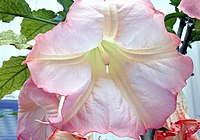
Photo from wikipedia
The eggplant (Solanum melongena) is a popular vegetable around the world. However, the origin and evolution of eggplant has long been considered complex and unclear, which has become the barrier… Click to show full abstract
The eggplant (Solanum melongena) is a popular vegetable around the world. However, the origin and evolution of eggplant has long been considered complex and unclear, which has become the barrier to improvements in eggplant breeding. Sequencing and comparative analyses of 13 complete chloroplast (cp) genomes of seven Solanum species were performed. Genome sizes were between 154,942 and 156,004 bp, the smallest genome was from S. torvum and the largest from S. macrocapon. Thirteen cp genomes showed highly conserved sequences and GC contents, particularly at the subgenus level. All genes in the 13 genomes were annotated. The cp genomes in this study comprised 130 genes (i.e., 80 protein-coding genes, 8 rRNA genes, and 42 tRNA genes), apart from S. sisymbriifolium, which had 129 (79 protein-coding genes, 8 rRNA genes, and 42 tRNA genes.). The rps16 was absent from the cp genome of S. sisymbriifolium, resulting in a nonsense mutation. Twelve hotspot regions of the cp genome were identified, which showed a series of sequence variations and differed significantly in the inverted repeat/single-copy boundary regions. Furthermore, phylogenetic analysis was conducted using 46 cp genomic sequences to determine interspecific genetic and phylogenetic relationships in Solanum species. All species formed two branches, one of which contained all cultivars of the subgenus Leptostemonum. The cp genome data and phylogenetic analysis provides molecular evidence revealing the origin and evolutionary relationships of S. melongena and its wild relatives. Our findings suggest precise intra- and interspecies relatedness within the subgenus Leptostemonum, which has positive implications for work on improvements in eggplant breeding, particularly in producing heterosis, expanding the source of species variation, and breeding new varieties.
Journal Title: Current Issues in Molecular Biology
Year Published: 2023
Link to full text (if available)
Share on Social Media: Sign Up to like & get
recommendations!